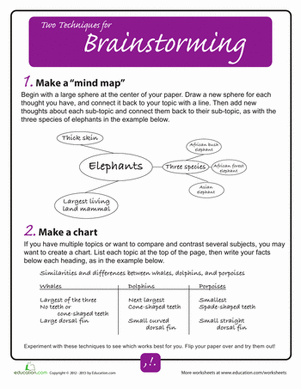Activity
Memorizing Techniques
It’s the day before the test, and you still have a ton to memorize! Sound familiar? Every student knows what it is like to sit down in front of a textbook and try to make the names, dates or formulas stick. Do you have any special techniques you use to memorize facts? In this project, you'll explore different techniques in order to determine the best way to memorize.
Problem:
What is the best way to memorize something?
Materials:
- Paper
- 3 pens
- Timer
- 12 volunteers
- Notebook
Procedure:
- Write down a string of random numbers.
- Separate the volunteers into groups of three.
- Give the first group 1 minute to memorize the numbers on the paper.
- Give the second group a blank piece of paper and a pen.
- Give them 1 minute to write down the numbers as a way to memorize them.
- Give the third group partners who will recite to them the string of numbers for 1 minute.
- Think about all the techniques this experiment will be using. Which do you think will be most effective? Write down your guess, often called a hypothesis, in your notebook.
- Ask each volunteer to recite to you as many numbers that they can remember.
- Write down the amount of numbers each volunteer remembered.
- Look over your data. Were the results what you expected?
Results:
Group 2 should have memorized the most numbers, and Group 3 should have memorized the least.
Why?
Group 2 had the technique that put the volunteer into a very involved state. They not only had visual memorization, but challenged themselves to writing down each number in the correct order. Group 1 was the control volunteers. All they had was visual memorization. Group 3 did not have visual memorization, but auditory memorization. Research has concluded that seeing things imprints that idea into our brains better than hearing something. We receive a vivid image of what it looks like and how that moment was. When we hear something, our sense of it is very weak. Hearing something does not leave as much of an impact into our minds. What about colored visuals, or making up a song? There are many more ways to memorize things. You could discover an even better method if you keep experimenting!
Education.com provides the Science Fair Project Ideas for informational purposes only. Education.com does not make any guarantee or representation regarding the Science Fair Project Ideas and is not responsible or liable for any loss or damage, directly or indirectly, caused by your use of such information. By accessing the Science Fair Project Ideas, you waive and renounce any claims against Education.com that arise thereof. In addition, your access to Education.com's website and Science Fair Project Ideas is covered by Education.com's Privacy Policy and site Terms of Use, which include limitations on Education.com's liability.
Warning is hereby given that not all Project Ideas are appropriate for all individuals or in all circumstances. Implementation of any Science Project Idea should be undertaken only in appropriate settings and with appropriate parental or other supervision. Reading and following the safety precautions of all materials used in a project is the sole responsibility of each individual. For further information, consult your state's handbook of Science Safety.














